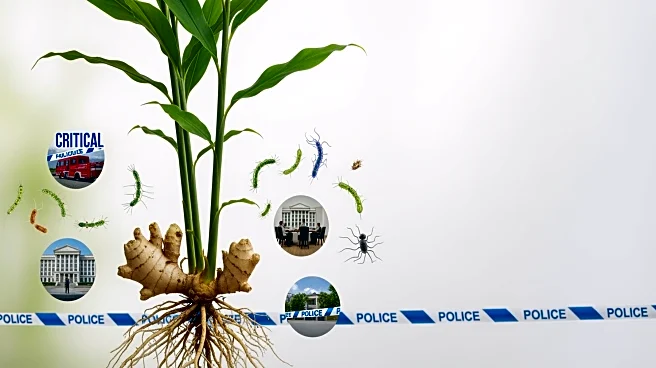What's Happening?
A recent study has explored the microbiome and metabolome of ginger, focusing on how these elements influence nutrient cycling and crop yield. Researchers analyzed 36 composite samples from two ginger cultivars with differing yields, using high-throughput
sequencing to profile the associated microbiomes. The study identified 5970 bacterial/archaeal operational taxonomic units (OTUs) and 1701 fungal OTUs, revealing significant differences in microbial community assembly between the two cultivars. Bacterial communities were largely shaped by stochastic processes, while fungal communities were influenced by deterministic processes. The study also highlighted the role of host genotype in modulating niche-specific microbial structuring, with significant variations in microbial diversity across different plant compartments.
Why It's Important?
This research is significant as it provides insights into how microbiomes can be leveraged to improve agricultural productivity. By understanding the microbial and metabolic interactions within ginger plants, farmers and agricultural scientists can develop strategies to enhance crop yields and resilience. The study's findings suggest that specific microbial taxa and host metabolites play crucial roles in nutrient cycling and disease suppression, which could lead to more sustainable farming practices. Additionally, the identification of keystone taxa within the ginger microbiome offers potential targets for biotechnological applications aimed at boosting plant growth and health.
What's Next?
Future research may focus on applying these findings to other crops, exploring the potential for microbiome manipulation to enhance agricultural productivity. There is also scope for developing microbial consortia that can be used as biofertilizers or biopesticides, tailored to specific plant genotypes and environmental conditions. Stakeholders in the agricultural sector, including policymakers and industry leaders, may consider investing in microbiome research to drive innovation in crop management and food security.
Beyond the Headlines
The study underscores the complex interplay between plant genetics and microbial communities, highlighting the potential for precision agriculture. Ethical considerations may arise regarding the manipulation of microbiomes, particularly in terms of biodiversity and ecosystem balance. Long-term shifts in agricultural practices could result from integrating microbiome-based strategies, potentially reducing reliance on chemical fertilizers and pesticides.















